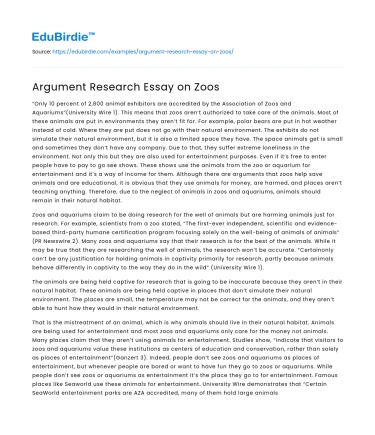“Only 10 percent of 2,800 animal exhibitors are accredited by the Association of Zoos and Aquariums”(University Wire 1). This means that zoos aren’t authorized to take care of the animals. Most of these animals are put in environments they aren’t fit for. For example, polar bears are put in hot weather instead of cold. Where they are put does not go with their natural environment. The exhibits do not simulate their natural environment, but it is also a limited space they have. The space animals get is small and sometimes they don’t have any company. Due to that, they suffer extreme loneliness in the environment. Not only this but they are also used for entertainment purposes. Even if it’s free to enter people have to pay to go see shows. These shows use the animals from the zoo or aquarium for entertainment and it’s a way of income for them. Although there are arguments that zoos help save animals and are educational, it is obvious that they use animals for money, are harmed, and places aren’t teaching anything. Therefore, due to the neglect of animals in zoos and aquariums, animals should remain in their natural habitat.
Zoos and aquariums claim to be doing research for the well of animals but are harming animals just for research. For example, scientists from a zoo stated, “The first-ever independent, scientific and evidence- based third-party humane certification program focusing solely on the well-being of animals of animals” (PR Newswire 2). Many zoos and aquariums say that their research is for the best of the animals. While it may be true that they are researching the well of animals, the research won’t be accurate. “Certainonly can’t be any justification for holding animals in captivity primarily for research, partly because animals behave differently in captivity to the way they do in the wild” (University Wire 1).
Save your time!
We can take care of your essay
- Proper editing and formatting
- Free revision, title page, and bibliography
- Flexible prices and money-back guarantee
The animals are being held captive for research that is going to be inaccurate because they aren’t in their natural habitat. These animals are being held captive in places that don’t simulate their natural environment. The places are small, the temperature may not be correct for the animals, and they aren’t able to hunt how they would in their natural environment.
That is the mistreatment of an animal, which is why animals should live in their natural habitat. Animals are being used for entertainment and most zoos and aquariums only care for the money not animals. Many places claim that they aren’t using animals for entertainment. Studies show, “indicate that visitors to zoos and aquariums value these institutions as centers of education and conservation, rather than solely as places of entertainment”(Ganzert 3). Indeed, people don’t see zoos and aquariums as places of entertainment, but whenever people are bored or want to have fun they go to zoos or aquariums. While people don’t see zoos or aquariums as entertainment it’s the place they go to for entertainment. Famous places like Seaworld use these animals for entertainment. University Wire demonstrates that “Certain SeaWorld entertainment parks are AZA accredited, many of them hold large animals such as killer whales, whose lifespans should be much longer than the ones they have in SeaWorld facilities”(2). It even states in the name that it’s an entertainment park. Many other places also say entertainment parks or amusement parks as a description. What the zoos and aquariums get from using these animals is money. The zoos and aquariums not only use the animals for money, but they also harm them. Which is why they aren’t living as long and why they shouldn’t be in zoos or aquariums.
Lastly, zoos and aquariums are claiming to help preserve species, but in reality harming animals while taking care of them. PR Newswire acknowledges that “ Four major institutions have already distinguished themselves in the rollout of the humane conservation programs” (2). The most popular claim made by zoos or aquariums to justify why they should exist is that they are helping preserve species. These places act like they are there to help animals, but are hurting them. For example, “When trapped in large tanks such as the ones in oceanic theme parks, the orcas are forced to swim circles at the surface for most of their life”(University Wire 2). Although, they are being kept “safe” a lot of these species don’t get to live their full life because they are stuck in these places. This is unfair to the animal. Animals should be able to live freely.
Zoos and aquariums' reasons for their existence are that they are conserving animals, research, and education, but in reality, they aren’t doing what they claim. It’s people's responsibility to research whether or not the place they are visiting is helping animals. Not all place intends to use the animals or harm them. This is why research must be done before visiting somewhere. Next time you think about visiting a zoo think about the animals and the damage that's being done.
Work Cited
- Aspinall, Damian.“Zoos Are Where the People Come First, Not the Animals.”TheIndependent (Daily Edition),15Aug.2019, p.40.Sirsissuesresearcher, explore.proquest.com/sirsissuesresearcher/document/2311773086?accountid=75878. Accessed 31 Mar. 2020.
- Ganzert, Robin. “The Moral Case for Captive Animals.” Deseret News, 3 Feb. 2017. Sirsissuesresearcher,explore.proquest.com/sirsissuesresearcher/document/2264339130?a ccountid=75878. Accessed 31 Mar. 2020.
- “Is It Ethical to Keep Wild Animals in Captivity? No, Animals Belong...” UniversityWire, 20 Feb. 2019. Sirsissuesresearcher, explore.proquest.com/sirsissuesresearcher/document/2265372514?accountid=75878. Accessed 31 Mar. 2020.
- “Is It Ethical to Keep Wild Animals in Captivity? Yes, Zoos Have...” University Wire, 20 Feb. 2019.Sirsissuesresearcher,explore.proquest.com/sirsissuesresearcher/document/2265372043?accountid=75878. Accessed 31 Mar. 2020.
- “Millions of Animals Living in World's Zoos and Aquariums to Be...” PR Newswire,14 June 2016.Sirsissuesresearcher,explore.proquest.com/sirsissuesresearcher/document/2265815 970?accountid=75878. Accessed 11 Mar. 2020.
- Pucillo, Danielle. “Should Animals Be Kept in Captivity?” University Wire, 27 Sept. 2016. Sirsissuesresearcher,explore.proquest.com/sirsissuesresearcher/document/2265380153?a ccountid=75878. Accessed 31 Mar. 2020.






 Stuck on your essay?
Stuck on your essay?

